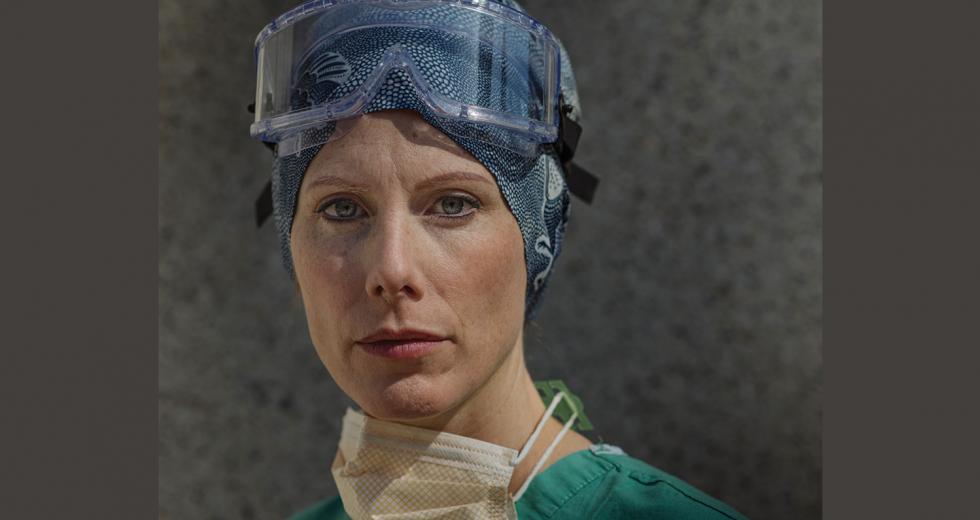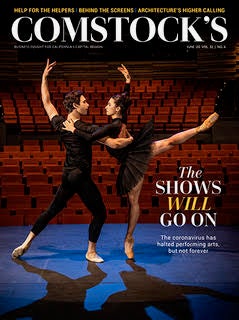Heather Donaldson was on a ski trip in Tahoe last December when she “got a little overconfident” and fell. She heard two pops but skied the rest of the way down and did one last run before she, her fiance and friends packed it up. She tried to work the following day at her job as a critical care nurse in the intensive care unit at UC Davis Medical Center in Sacramento, but she was sent home on crutches. She had torn her ACL, but because about half of the ligament remained attached, the injury could heal with physical therapy.
“That was like this major thing I was wondering how I was going to get to the other side of, and then the pandemic happened, and I was like, ‘Oh, God,’” Donaldson says.
Donaldson — like much of the rest of the world — has acutely felt the effects of the coronavirus pandemic on both a personal and professional level. Her workplace started preparing for the outbreak early, after it diagnosed in late February what was then the possible first case of COVID-19 due to community transmission in the United States. She says California Gov. Gavin Newsom’s stay-at-home order March 19 paired with her hospital’s preparedness have been effective in flattening the curve and keeping the Medical Center below capacity. By mid-May, the hospital had treated 172 patients who had tested positive. This was the lowest number of COVID-19 patients of the five academic medical centers in the UC Health’s system.
“That aspect of it has not been overwhelming,” Donaldson says. “There are other things that have been very difficult. I personally am not experiencing fear and anxiety, and I’m not really sure why that is. But there definitely are other people I work with that are … and it’s really difficult to see your coworkers go through that.”
Some occupations are inherently more emotionally demanding than others. Doctors, nurses and other health care workers, and first responders are routinely exposed to stress and trauma that can lead to anxiety, depression, post-traumatic stress disorder and other psychological disorders. Now under the gloom of a pandemic, people on the front lines of the crisis are encountering a level of unprecedented stressors layered onto already challenging jobs.
“(This) will undoubtedly change many ways we work and cope. … Many staff are expecting to get infected and know that some of them will die as a result, but they are still going to work every day despite this. They are heroes and will, hopefully, be recognized as such. But, of course, there is a personal psychological and family toll, and we are expecting to be providing more counseling, debriefing, treatment and support for quite a while.”
Peter Yellowlees PSYCHIATRIST AND CHIEF WELLNESS OFFICER UC DAVIS HEALTH
“(This) will undoubtedly change many ways we work and cope and will put more emphasis on health care staff protecting themselves and looking after themselves than has been traditional in the past,” says Dr. Peter Yellowlees, a psychiatrist and chief wellness officer for UC Davis Health. “Many staff are expecting to get infected and know that some of them will die as a result, but they are still going to work every day despite this. They are heroes and will, hopefully, be recognized as such. But, of course, there is a personal psychological and family toll, and we are expecting to be providing more counseling, debriefing, treatment and support for quite a while.”
‘Anxiety Is Palpable’
Brian Trainor, a UC Davis professor of psychology, says humans can become accustomed to many types of stressors, meaning the body’s physical response decreases with repeated exposure. “It’s this physical response that we think contributes to most of the negative health outcomes we associated with being ‘stressed out,’” Trainor says. But humans have a much harder time adapting to social stressors, like discrimination, bullying or, in the coronavirus context, lockdowns that prevent people from being in the presence of others.
Doctors and nurses who are exposed to human suffering caused by the coronavirus experience a form of social stress, Trainor says. Evidence also suggests some stress can be socially transmitted. “In other words, being exposed to patients suffering from COVID-19 — who are experiencing their own stress of isolation and fear of death — is very likely to trigger similar physiological responses in health care workers,” he says. Another stressor: the long shifts that isolate these workers from their family and friends.
“I think you can make a strong case that the COVID-19 outbreak has a strong social stress component,” Trainor says. “Furthermore, its prolonged and intense nature will make it much more difficult to adapt to. We know that social stressors increase risk for depression and anxiety disorders, so it will be very important for our society to (provide) mental health support for those treating patients with COVID-19.”
In April, at the same time UC Davis Medical Center continued to gear up for more cases, Sacramento-based WellSpace Health reported that telephone calls and texts to the suicide prevention crisis line it operates (which answers calls to three lifelines, including the National Suicide Prevention Lifeline) increased by 40 percent between February and March. WellSpace answered 4,713 calls in March. The line averaged 3,350 suicide prevention calls monthly in 2019.
“People feel exceptionally helpless right now, and those feelings are translating to thoughts of suicide and self-harm,” says Jonathan Porteus, a psychologist and WellSpace CEO, in a news release. “Anxiety in the community is palpable. People are more isolated as they try to cope with pandemic fears, unemployment, financial stress and increase substance use. Add more time around firearms, increased rates of domestic violence, and it creates a dangerous paradigm.” Porteus advises people to seek social connection through virtual means.
While mental health experts say everyone needs to practice self-care during this pandemic, external support can come from a social network of people on a mission to help the helpers. For example, as executive director of Law Enforcement Chaplaincy Sacramento, Mindi Russell oversees around-the-clock rapid-response teams that provide emotional crisis support for people in the aftermath of trauma, loss and grief. LECS works with law enforcement agencies, school districts, government agencies, businesses, churches and other institutions.
Russell’s first major trauma experience happened in 1972, as a volunteer for the Red Cross for the Summer Olympics in Munich, West Germany — where she and her husband lived for his stint in the Army — when a Palestinian terrorist group killed 11 members of the Israeli team and a police officer. She was assigned to help a couple American athletes, “although we were told they were not allowed to talk about the massacre or their fears. (We were) just to be with them.” Three decades later, she worked as a chaplain in New York for the first 16 days after 9/11.
Chaplains are considered essential workers, and those under age 65 and using protective measures remain deployed during shelter-in-place orders to assist people in emotional or spiritual distress. “What I am seeing is that it could be that a loved one died, which is very traumatic anytime, but now you filter everything that happens to people through COVID-19,” Russell says. “So all the trauma, all the crisis, all the tragedy is filtered through COVID-19, which has exaggerated and distorted and amplified more fear, more grief, more loss, more trauma.”
LECS chaplains also work a 24-hour hotline, which Russell says saw a spike in calls on March 13, the day President Donald Trump declared a national emergency, which was two days after the World Health Organization declared the coronavirus a pandemic. “This is when people started to go, ‘Wait a minute, this feels way more real now,’” she says. “‘I’m more nervous, I’m more concerned,’ and what happens is they start thinking of the future and play out worst scenarios. … If we can bring people into the reality of they’ve got a lot more control than they think, and they can do a lot more energywise putting it into the positive than the negative, then they’re going to come out of it on the other end.”
Critical care nurse Heather Donaldson, who works in the ICU at
the UC Davis Medical Center, goes on long bike rides to help cope
with stress from work. (Photo by Ryan Angel Meza)
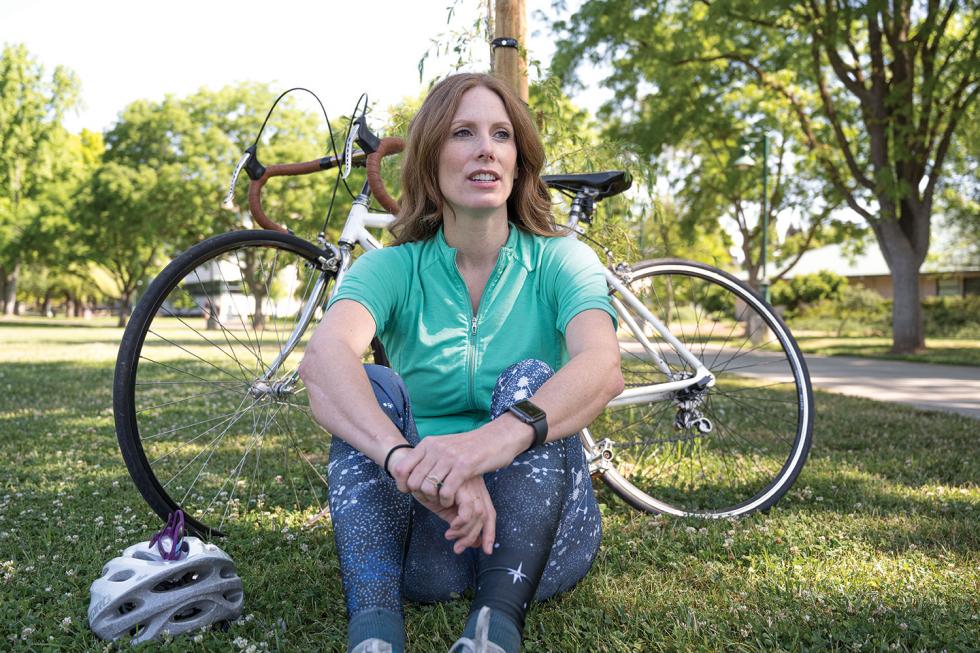
Increased Need for Support
In 2018, Gold River-based technology company Cordico launched a customized wellness app in partnership with the Vacaville Police Department. Founder and CEO David Black, who is a psychologist, says even before the pandemic began, his company was growing, its apps used by dozens of law enforcement agencies across the country, and he was in talks with hospitals, school districts and other groups.
Related Content: New app helps law enforcement deal with mental health
Only a week after California’s stay-at-home order, Black says he was already seeing a big uptick in business. “We’re seeing increased demand across vertical markets, from medicine to high tech, as everyone is experiencing extremely heightened levels of stress now.” He says the app is especially beneficial for professions with a cultural barrier to admitting a problem and seeking help.
This mentality can be found in the medical profession, says Yellowlees of UC Davis Health. “Doctors in particular are trained to ignore their own needs in the face of exposure to repeat traumas that occur in the health workplace and to just get on and see the next person, with no time for reflection or working through the process of trauma and grief,” he says. “This can lead in many to a great reluctance to seek help and a feeling of shame at ‘failing’ to manage and cope with their emotional reactions.”
Because UC Davis Medical Center was the site of an early case of COVID-19 (although subsequent reports confirm the coronavirus was spreading in the U.S. weeks before), the hospital’s leadership immediately took steps to prepare for a surge in patients, says Angela Drake, a psychiatry professor involved in efforts to support staff wellness. UC Davis Health CEO David Lubarsky also launched a new communication plan for medical staff, which includes frequent updates from leadership and weekly virtual town halls.
“It has been well-documented that front-line providers are experiencing high levels of physical and psychological stress related to working directly with patients with a new and highly infectious virus for extended periods of time,” Drake says, pointing to a survey of 1,257 nurses and doctors in China during the coronavirus epidemic there that found a “considerable proportion” reported symptoms of depression, anxiety, insomnia and distress as a result of working directly with patients with COVID-19.
In places such as New York City — a coronavirus epicenter with 193,000 confirmed cases compared to 1,237 cases in Sacramento County as of mid-May — health care workers have had it very bad, according to a story in The New York Times. Whether it’s the nonstop onslaught of sick patients, anxiety over dwindling supplies of personal protective equipment, or the pain of watching colleagues sickened or die from the disease, the stress and trauma have reached new heights. In late April, an emergency room doctor in Manhattan who treated coronavirus patients died by suicide, according to another Times story. Also around that time, an emergency medical technician in New York died by suicide after only three months on the job, according to a news report.
“That is hard for (patients and families), and it’s difficult for nurses. … They call, and we give them updates, and oftentimes nurses are giving the information that they can process a little bit easier. So we’re the ones who typically have a pretty good relationship with the families, so that is different, and it is stressful.”
HEATHER DONALDSON CRITICAL CARE NURSE UC DAVIS MEDICAL CENTER
Donaldson (speaking personally and not as a representative of her organization) says while the work of treating critically ill patients might not be substantially different, the hospital’s atmosphere has noticeably changed. Elective procedures have been canceled, health care workers fear being the vector that exposes their families to the disease, and constant media coverage has kept the pandemic at the forefront of everyone’s minds. Donaldson, who does not have children, sees her coworkers who are parents struggling with added tension in their home life, as they now balance child care or remote learning. Patients entering the hospital for COVID-19 require isolation, and medical staff must use more protective equipment. Visitors were not allowed until early May.
“That is hard for (patients and families), and it’s difficult for nurses, as well, because we are always a big part of end-of-life care or critical care management, with respect to communicating with the families,” Donaldson says of the changing visitation policies. “They call, and we give them updates, and oftentimes nurses are giving the information that they can process a little bit easier. So we’re the ones who typically have a pretty good relationship with the families, so that is different, and it is stressful.”
Donaldson credits her hospital’s preparedness and efforts to regularly communicate with staff as helping to ease anxiety, along with access to the Academic and Staff Assistance Program, which offers free on-campus counseling to faculty, staff and their immediate families.
“This has been and continues to be an evolving situation that requires health care professionals to adapt to change,” she says. “Though these changes require new challenges, I have felt supported by my facility, my unit and the team of health care professionals I work with every day.”
Finding Reprieve — and Meaning
Many nurses and other health care workers enter the profession because of their empathetic nature, but some, over time, absorb the trauma of their patients, which can lead to emotional exhaustion and withdrawal. “You’ve got these people with enormous hearts, the most caring people in the world, and over time they would find themselves becoming callous to suffering,” Black says. “We all have our limits to how much compassion you can have.” Compassion fatigue can be debilitating for people who don’t understand the condition or know how to get help. But help does exist.
For those with loved ones on the pandemic’s front line, Porteus recommends validating their feelings and acknowledging that what they are doing is scary. He also advises giving these people time to rest and recover from the exhaustion they feel.
In a long message sent to his WellSpace staff in late April, Porteus writes about the importance of people assisting others during the pandemic, in ways that are “purposeful, loving and courageous, which means that we create meaning through it. And meaning helps us survive our hardship.” He says this philosophy reflects the field of logotherapy, a therapy focused on finding meaning in life, which was founded by neurologist and psychiatrist Viktor Frankl, a Holocaust survivor.
“One of the things that helps the front-line workers is knowing they are doing something heroic,” Porteus later says. “It may be frightening, but they know they are doing something good for the sake of society. It helps the ambiguity to feel valued and needed and that they are doing something productive and contributing.”
This desire to find meaning — even in the most miserable of circumstances — can also help the mental well-being of people confined to their homes but who still possess the ability to do good deeds. Having a value system and being part of a social structure helps metabolize the anxiety people might be feeling, according to Porteus. The average American can help front-line workers with simple measures, such as following shelter-in-place orders, donating blood, sewing masks and expressing gratitude. “There’s a lot of community support right now for us,” Donaldson says. “I would say that community support really, really helps.”
Donaldson became a nurse six years ago after making a living as a musician in Los Angeles (she grew up in the Sacramento area, graduated from Davis Senior High School in Davis and earned her Bachelor of Science in Nursing degree from Sacramento State). “When I turned 30, I felt like I wanted more stability and a career in which I could help people, use my brain, work on my feet and where every day would be different,” she says. “My mother and father were operating-room nurses, both of my grandmothers were nurses, my mother’s sister was a nurse in Vietnam. … I tried to resist this path, but somehow, it was my destiny.” She is now in graduate school at Sonoma State studying to become a family nurse practitioner.
Her first year as a nurse in the ICU was “incredibly difficult,” Donaldson says, but over time, she has cultivated healthy coping mechanisms, including hobbies that keep her physically active. That hasn’t changed with the pandemic, although she and her fiance — a respiratory therapist — can no longer go to either of the two gyms at which they are members. Instead, they go on bike rides and spend time in their backyard, tending to their vegetable garden and raising chickens. “The dog has definitely been going on a lot of walks,” she says, chuckling. “My dog is like, ‘What is the matter with you? I’m done with these walks.’”
In early May, Donaldson was tested for SARS-CoV-2 antibodies as part of a clinical study being done at UC Davis Health, which would show if she had been exposed to coronavirus and was asymptomatic or had mild symptoms. Her first two test results were negative. She says although the threat isn’t over, spirits around her workplace seem to be improving.
Through regular physical therapy, Donaldson rehabilitated her knee over the past several months since the ski accident, transitioning from her temporary use of an electric bike she bought to ride to work back onto her road bike for long travels along the American River bike trail.
“Today, we’re going on a bike ride,” Donaldson says on a sunny spring morning in Sacramento. “We’re biking over to Temple Coffee, and (we’ll) get a coffee and support that business, and we’ve been getting our dinners at various restaurants in the area, trying to support them. We’ll go on our bike ride for 17 miles, and it’s going to be beautiful.”
—
Stay up to date on business in the Capital Region: Subscribe to the Comstock’s newsletter today.
Recommended For You
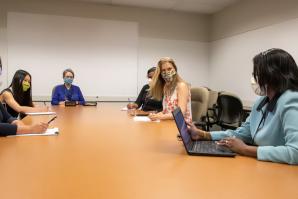
Health Officials Gear Up to Trace the Path of Coronavirus Contacts
Contact tracing has been used for decades to track the spread of infectious disease, but it was a process few in the general public understood until the highly-contagious coronavirus entered America’s consciousness in early 2020.
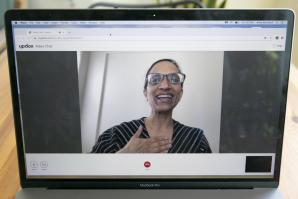
Virtual Medical Visits Are the New Normal During the Coronavirus Pandemic
California doctors are diagnosing anything from appendicitis to strep throat with only a phone during the coronavirus pandemic. Video visits and conversations are the closest doctors can get to patients who are sheltering in place and avoiding potential exposure from doctor visits.
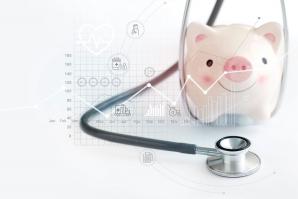
Health Care Jobs Spur Economic Optimism
Local economist says Capital Region’s strengths in health care sector help insulate it from effects of COVID-19
Health care and life sciences account for around 150,000 jobs in the Sacramento region, making the sector the largest private employer. Experts suggest that the public sector and health care may expand locally, even as the coronavirus pandemic contracts the global economy.



